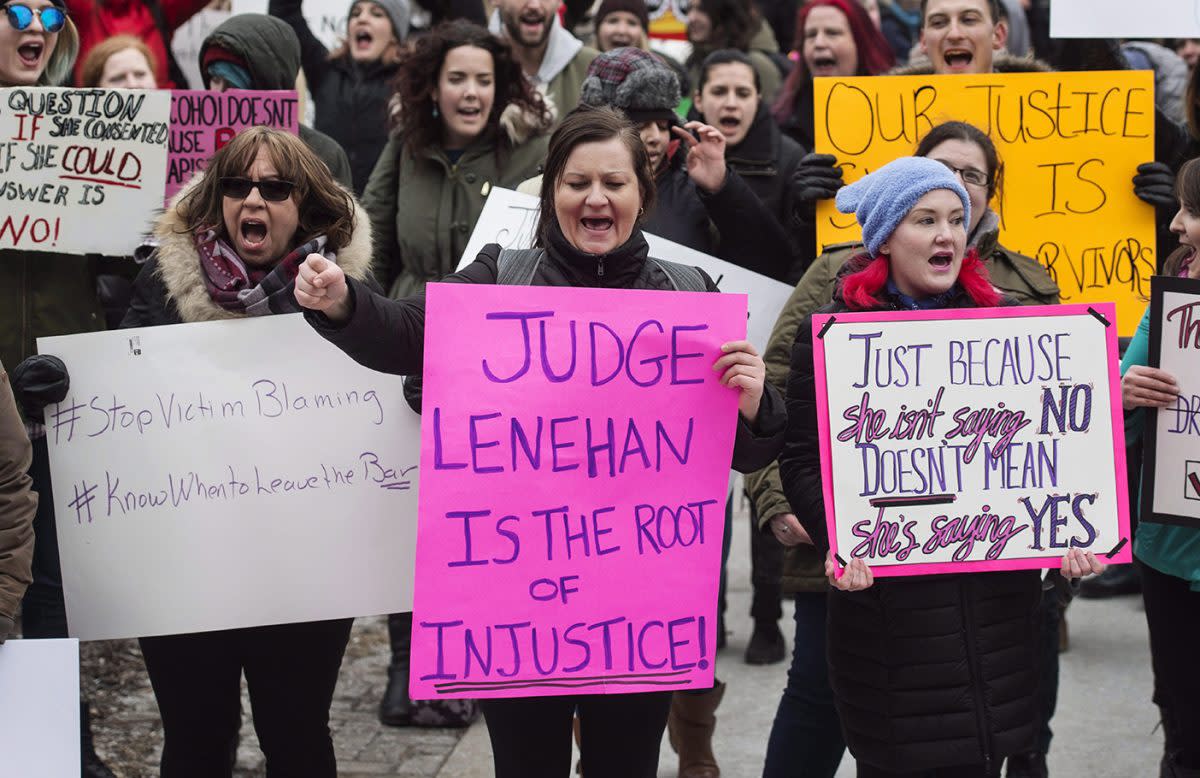Appetite for a new legal approach to sexual assault growing in Canada

Mandi Gray and more than 150 other sexual assault survivors sent an $7-million invoice to Prime Minister Justin Trudeau and Ontario Premier Kathleen Wynne last Tuesday to represent the costs they’ve incurred because they were sexually assaulted.
When Mustafa Ururyar was convicted in July 2016 of assaulting Gray, the judge ordered him to pay her $8,000 in restitutions to cover her own legal costs. (Ururyar is appealing his conviction.) The decision was seen as unusual, but Canada’s justice system is beginning to look into ways to handle sexual assault that either change the current criminal justice model for the crime or work outside of it.
The aim is to improve upon the fact that fewer than one in ten sexual assault survivors report the crime to police and only an estimated three out of every 1,000 of sexual assaults result in a criminal conviction.
“A large majority of sexual assault survivors are not even entering the criminal justice system,” Deb Tomlinson, co-chair of the Ending Violence Association of Canada, tells Yahoo Canada News. “The gateway is not being used, period.”
Federal Justice Minister Jody Wilson-Raybould led a Department of Justice knowledge exchange conference on March 8 to address the justice system’s response to sexual assault.
“It was a wonderful conference for myself as an advocate to be at, it was hugely validating,” said Corinne Ofstie, the strategic initiatives coordinator for the Association of Alberta Sexual Assault Services. “The appetite [for change] has significant momentum right now. At the knowledge exchange that appetite was huge.”

Alternative approaches to handling sexual assault
At the conference, Wilson-Raybould expressed her support for removing barriers that Canadian sexual assault survivors face in accessing justice, the Globe and Mail reports.
David Butt, a criminal lawyer in Toronto, was part of the knowledge exchange and says one thing that hit home for the participants was not just that the statistics on sexual assault reporting and convictions were so low, but that they had held for decades despite significant changes in sexual-assault laws in the 1980s and 1990s and ongoing work by advocates in the field.
“We are perpetuating a situation of profound failure to reach sexual assault survivors and afford them any approximation of justice,” Butt tells Yahoo Canada News. “This is not a tinkering situation. We’ve been tinkering for decades.”
Some programs aimed at helping sexual assault survivors navigate the justice system are already in place in Canada. The Independent Legal Advice for Survivors of Sexual Assault Pilot Program in Ontario provides four hours of free legal advice, for example.
And in the weeks since the Globe and Mail reported on the number of sexual assault cases classified as unfounded — that is, cases where police determined a crime was not attempted or committed — 54 police services across the country have committed to auditing their unfounded files.
In Winnipeg, every sexual assault complaint is reviewed by the sex crimes unit, and the city’s 2-per-cent unfounded rate is the lowest in Canada. “If you look at the practices in Winnipeg that are unique in Canada in terms of how they code founded and unfounded, there are some oversight and procedural changes that are promising,” Ofstie says.
Third-party reporting that would allow survivors to have evidence collected and stored anonymously is another option to consider, Tomlinson says, and increased training on sexual assault and the ways people respond to sexual trauma is necessary at all levels of the criminal justice system.
Rona Ambrose, the interim leader of the federal Conservative Party, tabled a bill last month that would make sexual assault law training mandatory for any lawyer who wishes to become a federally appointed judge. Bill C-337 is in committee as of March 9.
Another idea to consider is the ways that sexual assault survivors may want to access justice outside the traditional confines of the Canadian justice system, Butt says. “We see many many survivors looking for validation that they don’t get inside the justice system, looking for validation and a path to healing,” he says.
There may be cases where a civil justice model — where a criminal conviction is not sought but the standard of reasonable doubt is also not required — or the more informal idea of restorative justice, which focuses on rehabilitating offenders through reconciliation with victims, are good alternatives, he says.
Butt, Ofstie, and Tomlinson all say that part of the problem is that all the actors in the justice system live and work within a wider society where harmful and inaccurate stereotypes about sexual assault survivors still persist. Those stereotypes affect their work within the justice system, and vice versa.
“Myths and attitudes about sexual assault and sexual assault survivors remain the greatest barrier for the criminal justice system,” says Ofstie.
All three agree that we’re at an important time for taking action given that the public awareness of the problems and appetite for changes is high, thanks in part to the media attention in recent years on cases like that of Rehtaeh Parsons and Jian Ghomeshi.
“None of these problems are new. But what I’m seeing now is that they are getting the profile they deserve,” says Tomlinson, who has worked in sexual assault advocacy for about 25 years. “People are outraged and I think that puts pressure on our government and on our policy makers to respond.”
Much of his work involves representing sexual assault survivors as they navigate their way through the justice system. However, Butt is reluctant to push for a specific solution. As a self-described “elite” within the justice system, his role is not to prescribe a particular course of action, he says.
“Justice reform has to be driven by a solid understanding of survivors’ realities and their needs,” Butt says. “I think we’ve had enough of elites telling other elites how to construct the justice system. I think we need to listen to survivors.”



